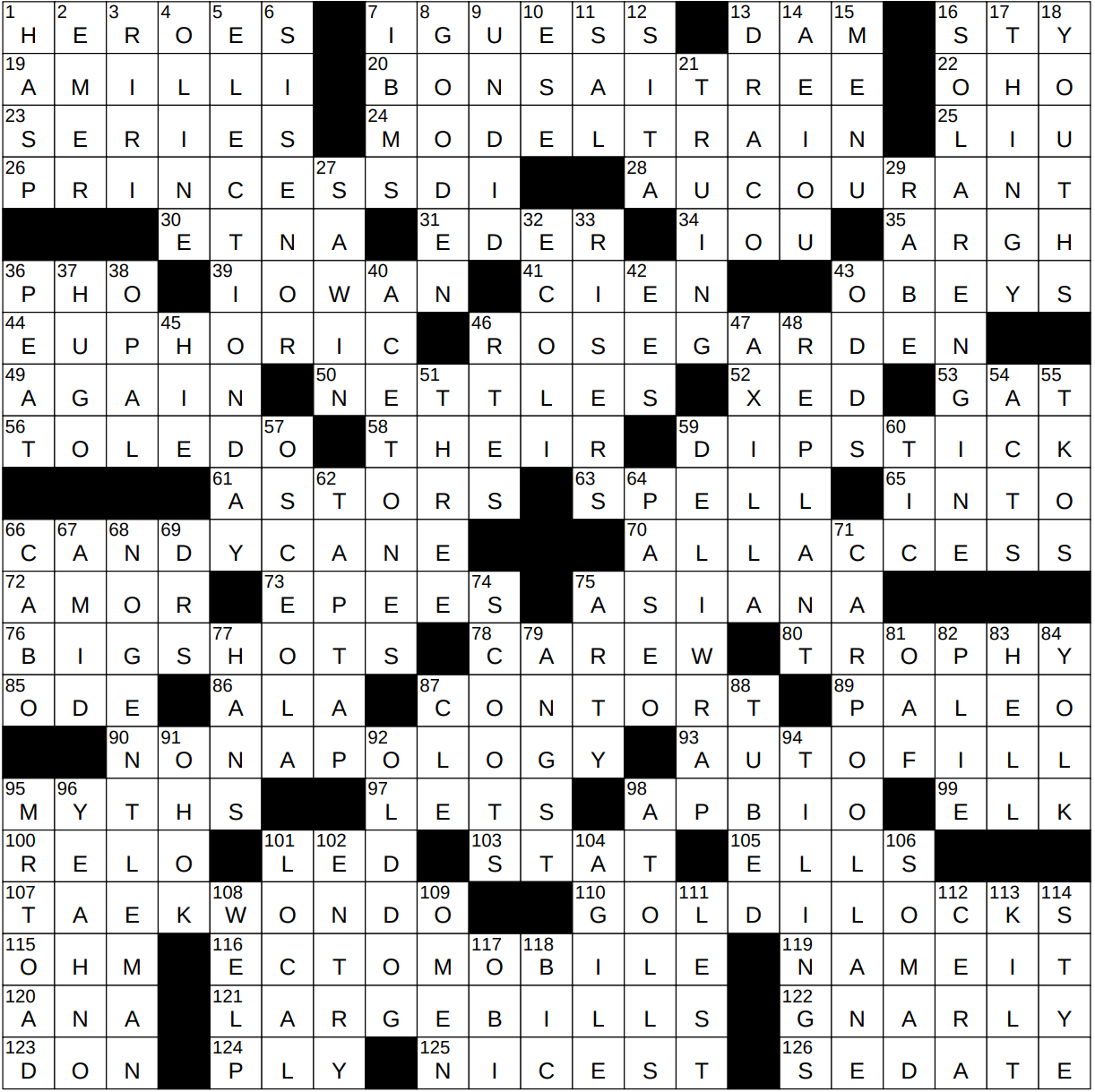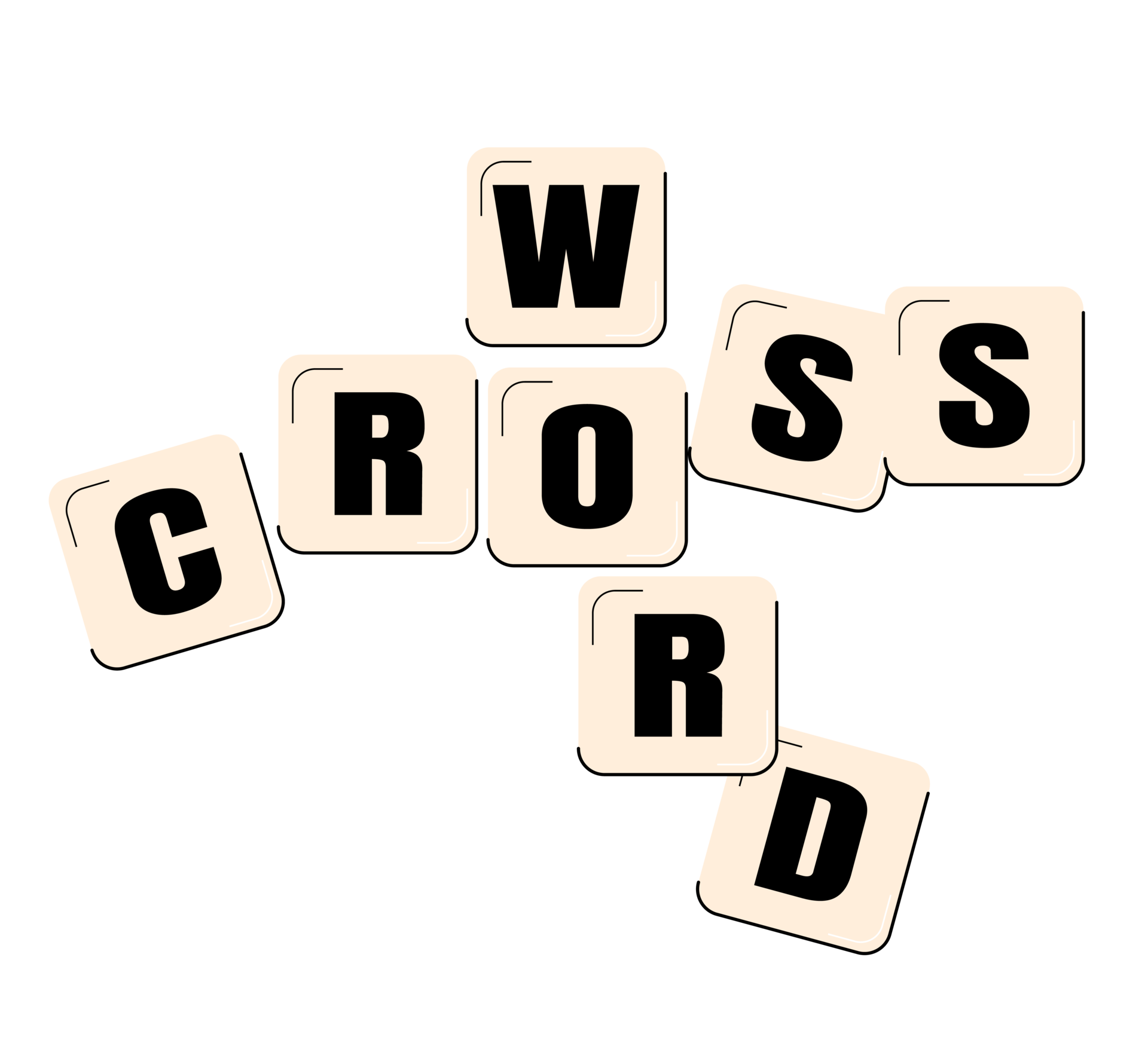Think Crossword Puzzle Clue: Unlock The Mystery And Boost Your Brain Power
Ever stumbled upon the "think crossword puzzle clue" and found yourself scratching your head? Don't worry; you're not alone! Crossword puzzles can be both a delightful challenge and a brain workout. In this article, we'll dive deep into the world of crossword clues, focusing on the keyword "think," and help you unravel the mystery behind it. Whether you're a seasoned puzzler or a curious beginner, this guide has got you covered.
Think crossword puzzle clue is one of those brain teasers that can leave even the sharpest minds pondering. But why does it matter? Well, solving crossword puzzles isn't just about filling in boxes; it's about stretching your mental muscles, improving vocabulary, and enhancing problem-solving skills. And let's be honest, there's nothing quite like the satisfaction of cracking a tough clue.
So, buckle up as we explore the ins and outs of the "think" crossword puzzle clue. We'll break it down step by step, uncovering tips, tricks, and strategies to help you become a crossword champion. Let's get started!
- Who Is Josh Gates Married To Now The Untold Story
- Is Crackle Free Unveiling The Truth Behind This Streaming Giant
What Exactly is a Think Crossword Puzzle Clue?
A "think crossword puzzle clue" is a type of hint that often requires you to ponder deeply. It could be related to synonyms, verbs, or even abstract concepts. The beauty of crossword puzzles lies in their ability to make you think outside the box—pun intended! This particular clue usually revolves around words or phrases associated with the act of thinking.
In the world of crosswords, the keyword "think" can appear in various forms. For instance, it might be a direct clue like "contemplate" or "consider," or it could be more cryptic, such as "brainstorm" or "mull over." The challenge lies in deciphering the intended meaning and fitting it into the grid.
Why is the Think Clue So Popular?
Think crossword puzzle clues are popular because they tap into our innate curiosity and love for mental challenges. They force us to dig deep into our vocabulary and cognitive abilities, making them an excellent tool for mental fitness. Plus, they're just plain fun!
- Hacks For Dayz Unlocking The Secrets Of Survival In A Postapocalyptic World
- Kevin James Sister A Closer Look At Her Life Career And Family
- They stimulate critical thinking.
- They enhance language skills.
- They provide a sense of accomplishment.
Common Variations of the Think Crossword Puzzle Clue
When you encounter the "think" clue in a crossword, it can come in many shapes and sizes. Here are some common variations you might come across:
1. Synonyms for Think
One of the most straightforward approaches is to use synonyms. Words like "ponder," "reflect," and "deliberate" are often used interchangeably with "think." Keep an eye out for these variations as they can be the key to solving the puzzle.
2. Abstract Concepts
Sometimes, the clue might be more abstract, such as "brainstorm" or "meditate." These clues require you to think about the broader implications of thinking itself. It's all about connecting the dots between the clue and the answer.
3. Phrasal Verbs
Phrasal verbs like "think about" or "think over" can also make an appearance. These clues often require you to consider the context in which the phrase is used, making them a bit trickier but all the more rewarding.
Tips for Solving Think Crossword Puzzle Clues
Solving crossword puzzles can be a bit daunting, especially when you encounter a tricky "think" clue. But fear not! Here are some tips to help you navigate these puzzles with ease:
1. Start with What You Know
Begin by filling in the clues you're confident about. This will give you a foundation to build upon and might even help you figure out the tougher clues through cross-referencing.
2. Use Crossword Solvers Wisely
While it's tempting to rely on crossword solvers, try to use them sparingly. They can be a great tool for verification, but solving the puzzle on your own is far more satisfying.
3. Expand Your Vocabulary
The more words you know, the better equipped you'll be to tackle crossword puzzles. Consider reading more, playing word games, or even learning a new language to expand your vocabulary.
Understanding the Psychology Behind Crosswords
Crossword puzzles are not just games; they're a fascinating glimpse into the human mind. The "think" clue, in particular, taps into our cognitive processes, encouraging us to analyze, synthesize, and evaluate information. Understanding the psychology behind crosswords can enhance your solving experience.
1. The Role of Pattern Recognition
Pattern recognition plays a crucial role in solving crossword puzzles. Our brains are wired to identify patterns, and this ability can help you spot connections between clues and answers.
2. The Importance of Context
Context is everything in crossword puzzles. A single word can have multiple meanings, and the surrounding clues can provide valuable hints about the intended answer.
Benefits of Solving Think Crossword Puzzle Clues
Solving crossword puzzles, especially those with "think" clues, offers numerous benefits beyond just entertainment. Here are a few reasons why you should incorporate them into your daily routine:
1. Improves Cognitive Function
Engaging in activities that challenge your brain, like solving crossword puzzles, can improve cognitive function and reduce the risk of cognitive decline as you age.
2. Enhances Vocabulary
Regularly solving crossword puzzles exposes you to new words and phrases, expanding your vocabulary and improving your communication skills.
3. Boosts Problem-Solving Skills
Crossword puzzles require you to think critically and creatively, enhancing your problem-solving skills in the process.
Where to Find Great Crossword Puzzles
Now that you're ready to take on the world of crossword puzzles, where can you find the best ones? Here are some top resources:
1. Newspapers and Magazines
Classic newspapers like The New York Times and The Guardian offer challenging and engaging crossword puzzles. They're a great place to start if you're looking for high-quality puzzles.
2. Online Platforms
There are numerous online platforms dedicated to crossword puzzles, offering a wide range of difficulty levels and themes. Some even allow you to create your own puzzles!
3. Mobile Apps
For those on the go, mobile apps are a convenient way to access crossword puzzles anytime, anywhere. Many apps also offer features like hints and timers to enhance your solving experience.
Daftar Isi
- What Exactly is a Think Crossword Puzzle Clue?
- Common Variations of the Think Crossword Puzzle Clue
- Tips for Solving Think Crossword Puzzle Clues
- Understanding the Psychology Behind Crosswords
- Benefits of Solving Think Crossword Puzzle Clues
- Where to Find Great Crossword Puzzles
- A Brief History of Crossword Puzzles
- Advanced Techniques for Solving Think Clues
- Joining the Crossword Community
- Conclusion: Keep Thinking and Solving
A Brief History of Crossword Puzzles
Crossword puzzles have been around for over a century, with the first known crossword appearing in 1913. Since then, they've evolved into a beloved pastime for millions of people worldwide. The "think" clue has been a staple in crossword puzzles for decades, challenging solvers to think deeply and creatively.
1. The Evolution of Crosswords
From simple word squares to complex themed puzzles, crosswords have come a long way. Today, they're more diverse than ever, catering to a wide range of interests and skill levels.
Advanced Techniques for Solving Think Clues
If you're ready to take your crossword-solving skills to the next level, here are some advanced techniques to consider:
1. Anagramming
Anagramming involves rearranging the letters in a clue to form a new word. This technique can be particularly useful for clues that involve wordplay.
2. Cryptic Clues
Cryptic crossword clues often require you to think outside the box. They might involve puns, double meanings, or hidden words, making them both challenging and rewarding.
Joining the Crossword Community
There's a vibrant community of crossword enthusiasts out there, eager to share tips, tricks, and puzzles. Joining this community can be a great way to improve your skills and make new friends.
1. Online Forums
Online forums dedicated to crossword puzzles are a treasure trove of information and support. You can ask questions, share your own puzzles, and learn from others.
Conclusion: Keep Thinking and Solving
In conclusion, the "think crossword puzzle clue" is more than just a challenge; it's an opportunity to grow and learn. By understanding the various forms and techniques involved, you can become a more proficient and confident crossword solver. So, the next time you encounter a "think" clue, don't shy away from it—embrace the challenge and let your mind soar!
Don't forget to share your newfound knowledge with others. Encourage friends and family to join you in the world of crossword puzzles, and who knows, you might just start a new tradition. Happy solving!
Article Recommendations
- The Darkest Black Person In The World A Fascinating Journey
- Colin Cowherd Wife Pics The Inside Story Yoursquove Been Waiting For



Detail Author:
- Name : Jacques Kertzmann
- Username : emilio.huel
- Email : rhea37@larson.com
- Birthdate : 1994-01-14
- Address : 832 Keeling Streets East Jaquelinborough, MN 29438
- Phone : (848) 636-3255
- Company : Kuhlman-Bauch
- Job : Interior Designer
- Bio : Ipsa veritatis eaque repudiandae et ut. Sapiente qui dolor temporibus quis. Sed magni dolores voluptatem animi. Enim quod quasi omnis.
Socials
facebook:
- url : https://facebook.com/yundta
- username : yundta
- bio : Doloremque nemo consequatur dolores suscipit.
- followers : 6943
- following : 2055
linkedin:
- url : https://linkedin.com/in/yundt1984
- username : yundt1984
- bio : Iure ad consequatur impedit.
- followers : 4785
- following : 1208
tiktok:
- url : https://tiktok.com/@austenyundt
- username : austenyundt
- bio : Ut atque a qui. Et amet ut id consequuntur distinctio.
- followers : 6738
- following : 1572
twitter:
- url : https://twitter.com/austen_real
- username : austen_real
- bio : Expedita a laudantium et eveniet. Rerum nihil cumque dolores aliquam magni.
- followers : 1783
- following : 2992
instagram:
- url : https://instagram.com/austen_yundt
- username : austen_yundt
- bio : Reprehenderit voluptas sed ipsam. Sed cum ullam quis natus iste. Unde minima aut qui et deserunt.
- followers : 5488
- following : 2087